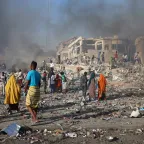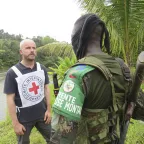Use of force in law enforcement operations
States often face situations in which their officials must use force to maintain or restore public security and law and order in armed conflicts or other situations of violence. Such use of force is …
States often face situations in which their officials must use force to maintain or restore public security and law and order in armed conflicts or other situations of violence. Such use of force is …

Cluster munitions kill and injure large numbers of civilians and cause long-lasting socio-economic problems. The 2008 Convention on Cluster Munitions prohibits the use, production, stockpiling and …

Armed conflicts are increasingly fought in urban areas, but often with weapon systems that were originally designed for use in open battlefields. When used in populated areas, explosive weapons with …

It is those who carry weapons who can kill – and be killed. It is also they who can facilitate or hinder humanitarian action. The ICRC therefore maintains a dialogue with all weapon bearers, State …

Try one of the following resources:
Created in 1863, the ICRC library, alongside the ICRC archives, provides an indispensable documentary reference on the organization itself and international humanitarian law.
International humanitarian law is based on a number of treaties, in particular the Geneva Conventions of 1949 and their Additional Protocols, and a series of other instruments.
Customary international humanitarian law consists of rules that come from "a general practice accepted as law" and that exist independent of treaty law.